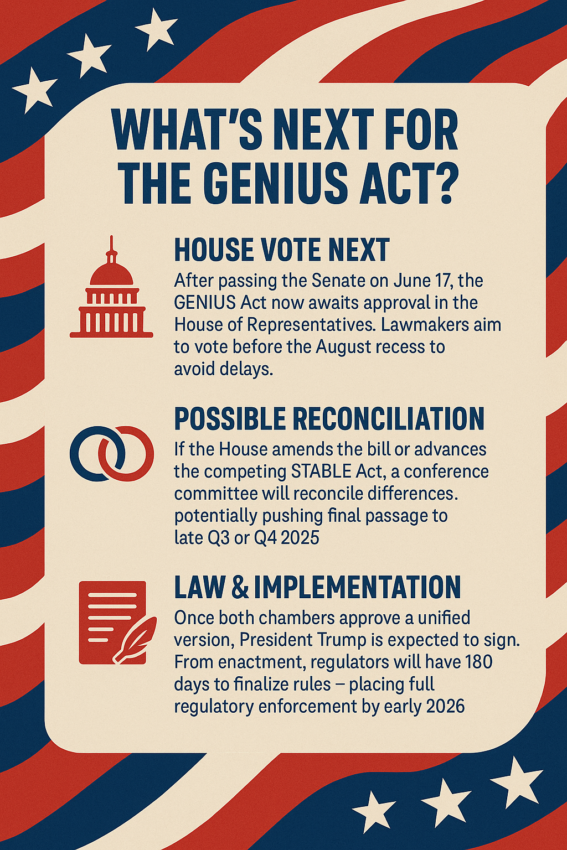Earlier this week, the GENIUS Act passed the Senate vote with bipartisan support, marking the first major crypto bill to be adopted by the US. But when will it become a law?
When does the stablecoin bill come into effect? Here’s a summary of the next steps to come for the GENIUS Act to become the official stablecoin law of the US.

Passing the House of Representatives
The bill now goes to the House, which has two main paths:
- Adopt the Senate version swiftly, avoiding delays.
- Or advance the STABLE Act, its own stablecoin bill, then reconcile differences through a conference committee.
The House aims to act before the August recess. Majority pressure and executive signaling may push timing.
The House of Representatives and the Senate are two separate chambers of the US Congress, each with distinct membership, rules, and political dynamics.
The bill passed the Senate 68–30, showing strong bipartisan support. That signals cross-party consensus, especially on systemic safeguards and institutional guardrails for stablecoins.
SponsoredProspects in the House are cautiously optimistic, but here’s a more nuanced view:
Positive Indicators:
- Senate momentum adds pressure on the House to act quickly, especially before the August recess.
- Bipartisan Senate vote provides political cover for moderate House members to back it.
- Key House Republicans (especially on the Financial Services Committee) support regulatory clarity for stablecoins.
Friction Points:
Sponsored- Some House Democrats remain skeptical, particularly around consumer protection and systemic risk oversight—some labeled the Senate version as too industry-friendly.
- Maxine Waters, the ranking Democrat on the Financial Services Committee, has pushed the alternative STABLE Act, which is stricter on reserves, audits, and government-issued token dominance.
- House leadership may insist on modifications—triggering a conference committee to reconcile with the Senate version.
Conference Committee (If Needed)
If the House modifies language, both chambers will form a conference committee to negotiate a unified text. This stage addresses discrepancies, such as oversight regimes, reporting frequency, and issuance thresholds.
After agreement, both the House and Senate must approve the final reconciled bill.
Presidential Signature
SponsoredOnce both chambers pass identical text, it goes to President Trump for his signature. The president has 10 days (excluding Sundays) to sign it into law or otherwise let it become law without signature.
Upon enactment, agencies (Fed, OCC, FDIC, CFTC, etc.) have 180 days to issue final rules capturing oversight, reserve requirements, audits, licensing, disclosures, and enforcement protocols.
GENIUS Act Timeline Summary
Sponsored| By late July, before recess | Expected Timing |
| House vote | By late July before recess |
| Conference Committee (if needed) | Late July – early August |
| Final congressional approval | Mid-August |
| Presidential signature | Late August (within 10 days post-passage) |
| Rulemaking completion | Approximately late February 2026 (180 days after enactment) |
If the House fails to act by August, the GENIUS Act risks losing momentum.
While it won’t kill the bill outright, it could push final resolution into late Q4 2025 or even 2026, depending on how political winds shift.
Overall, speed matters now if lawmakers want to lock in bipartisan support and capitalize on institutional readiness.

